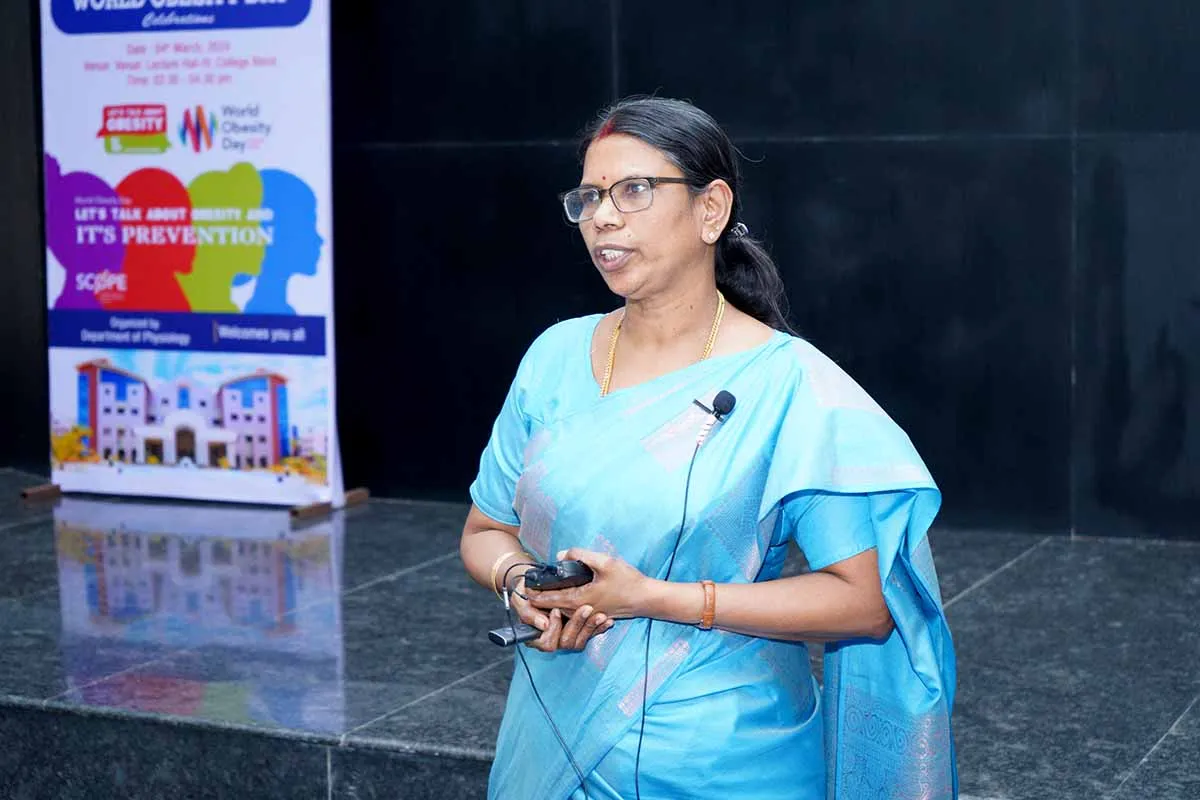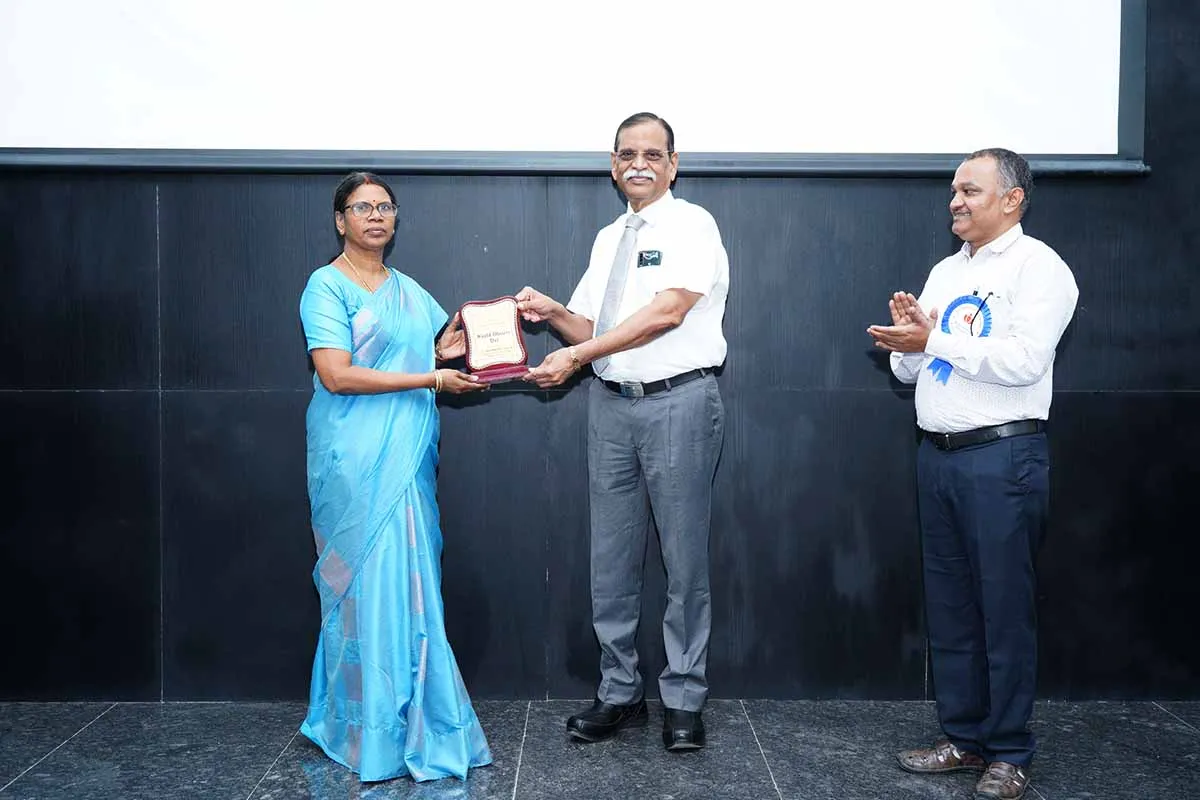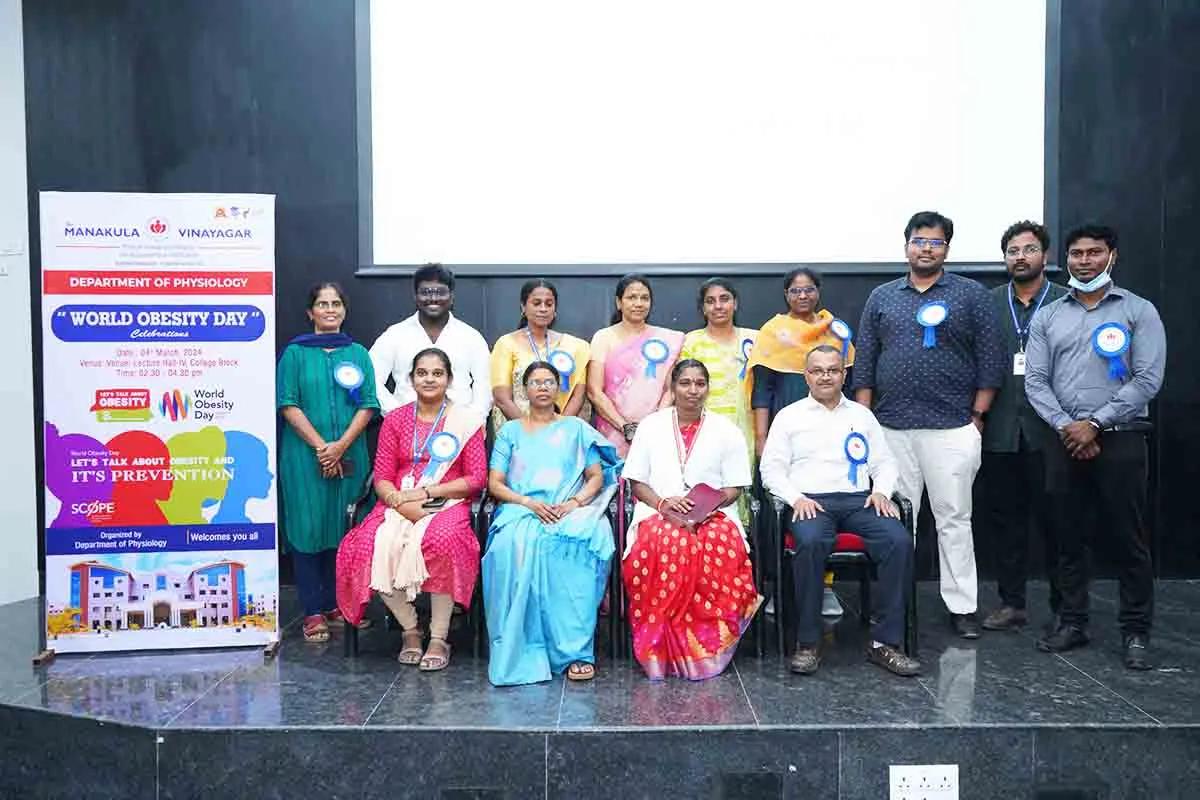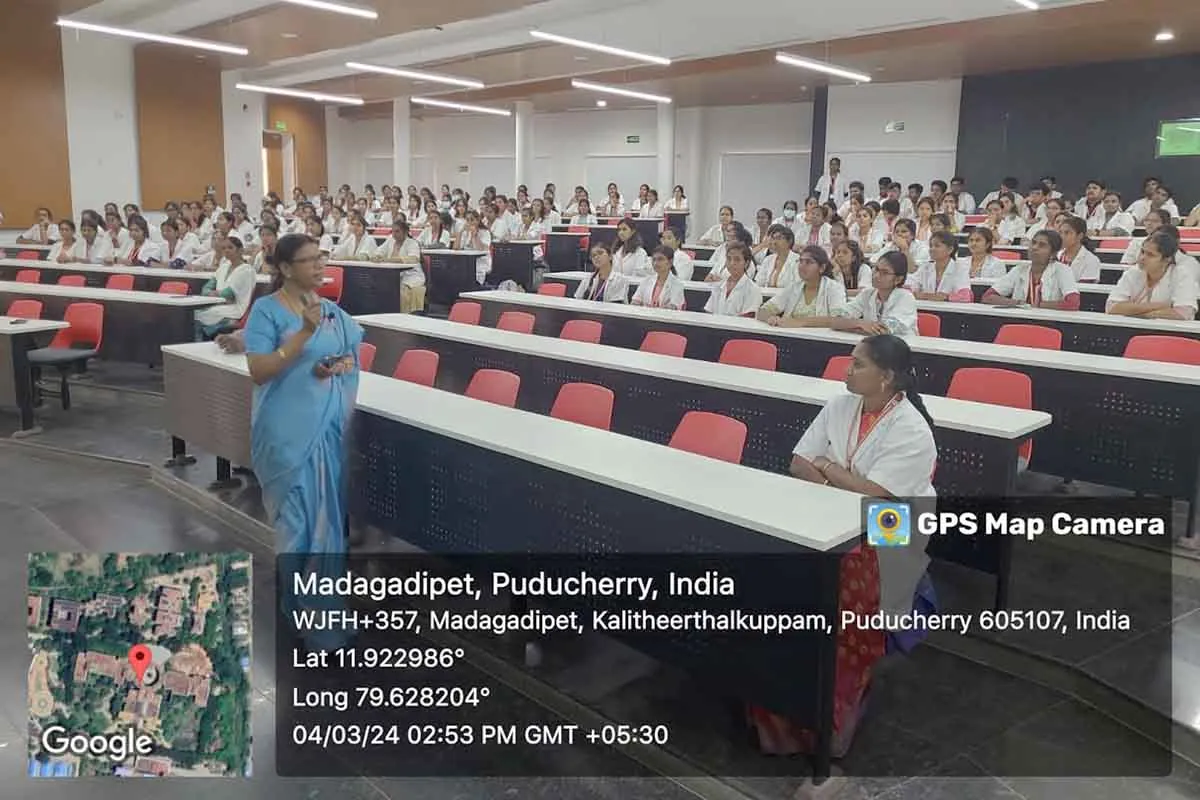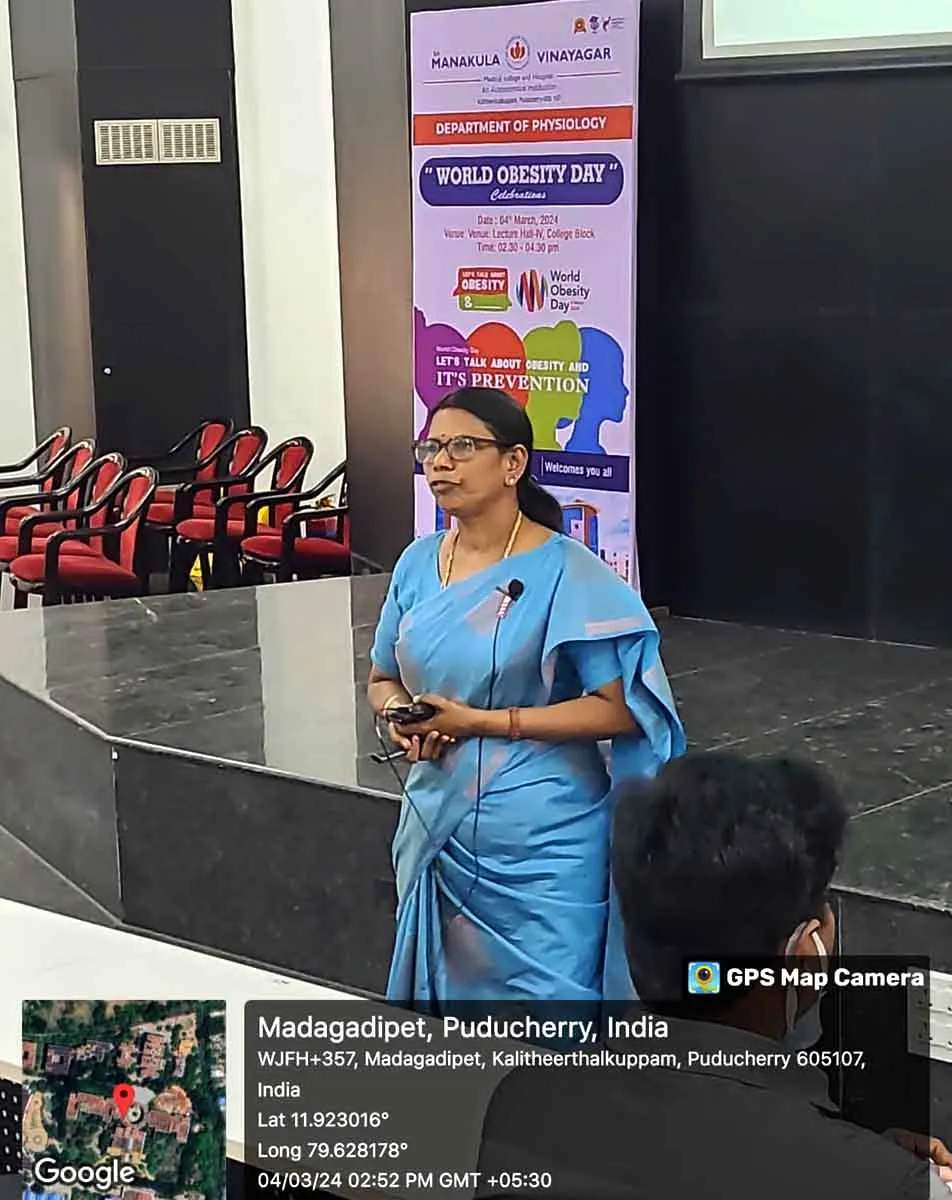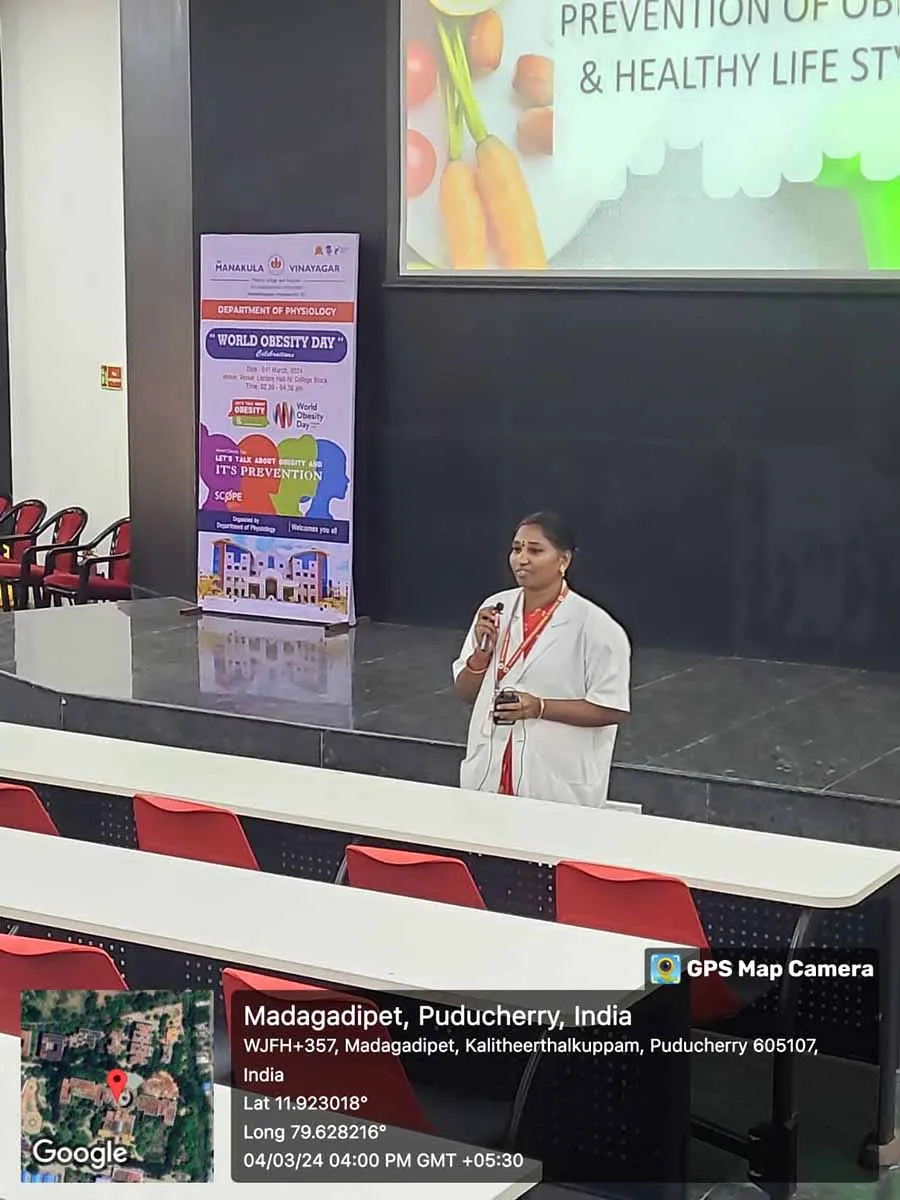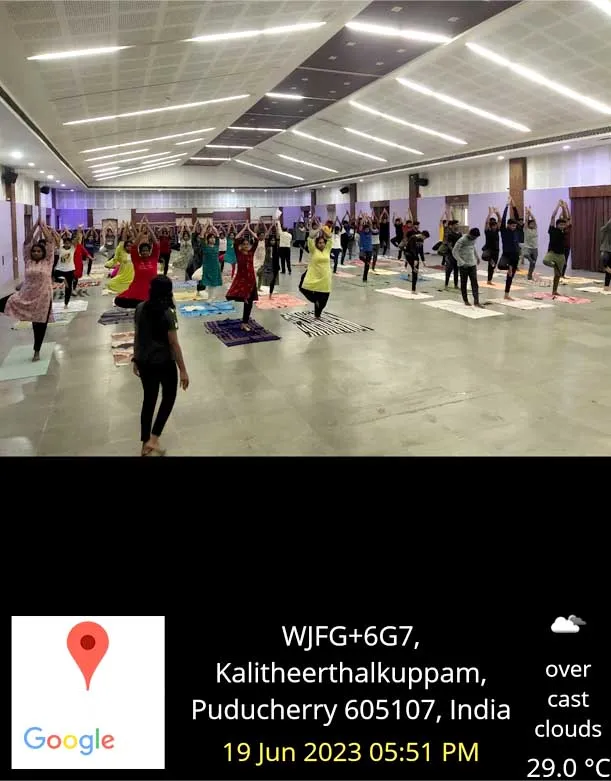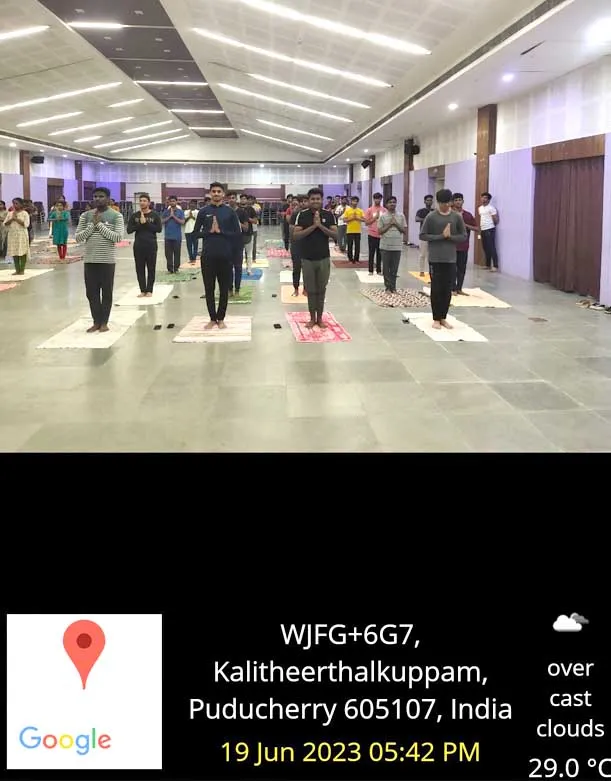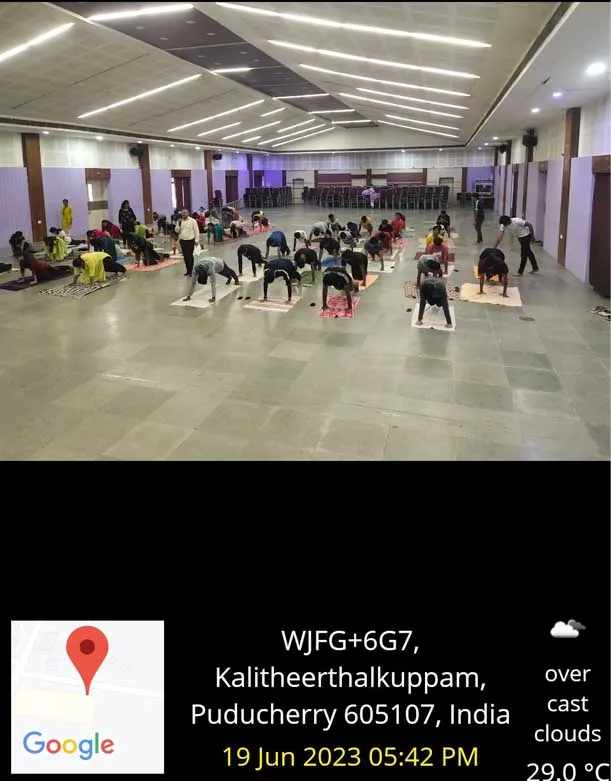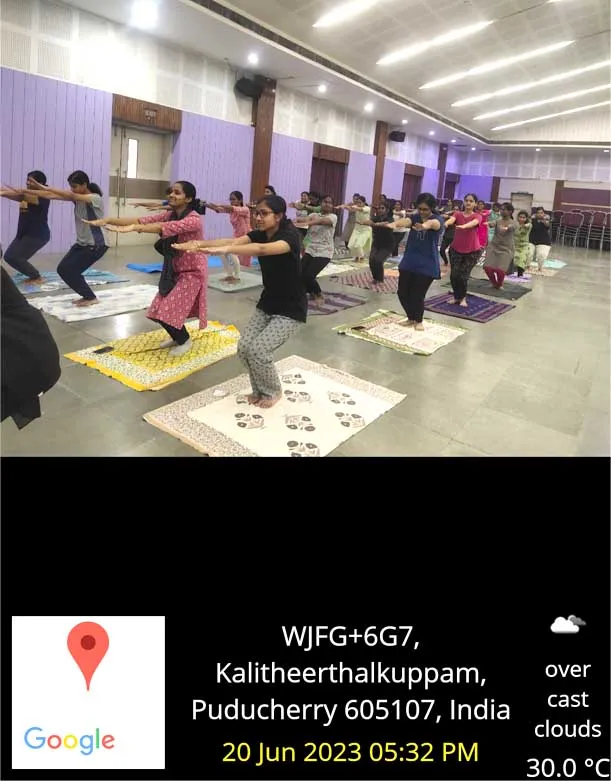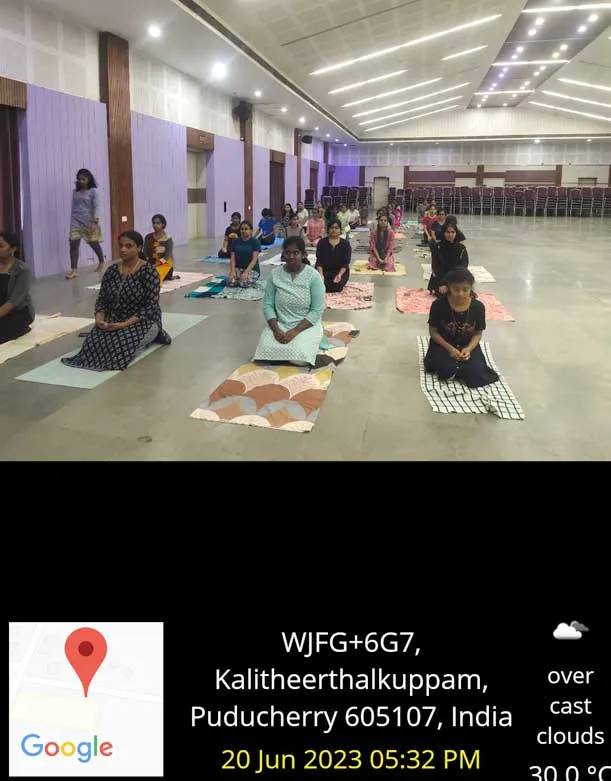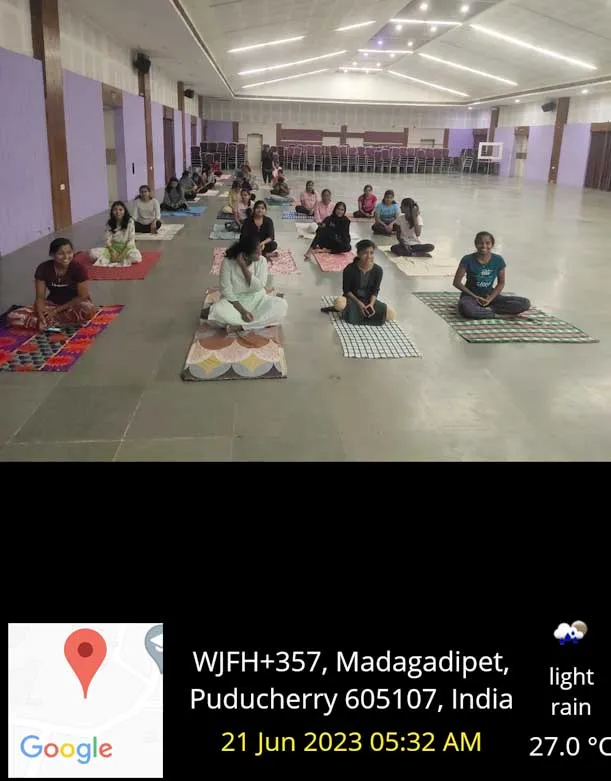The Department of Physiology being one of the three basic pioneer departments of the Sri Manakula Vinayagar Medical College and Hospital has been given the responsibility to impart medical education to the first year medical students since the inception of the college in 2005-06. The department has come a long way since then, under the guidance of senior experienced faculty members having good teaching and research background. A number of faculty members served the department from time to time and played pivotal role in improving the department and taking it to new heights.
Overview
Vision
- To provide Under Graduates and Post Graduates a comprehensive knowledge of normal functions of various organ systems of the human body and to facilitate better understanding of the physiological basis of health and diseases through interactive and interdisciplinary learning approaches that enable them to serve the humanity competently.
Mission
- To impart the highest possible standards of excellence in knowledge, skills and attitude through a well-designed curriculum in physiology.
- To collaborate with other disciplines to improve learning of physiology in an integrated manner.
- To foster the development of critical thinking and decision making skills with early clinical exposure.
- To engender a culture of continuous learning by active participation and involvement in all academic and research activities.
Program Specific Outcomes
UG – Department of Physiology
Generic outcome
To provide comprehensive knowledge of normal functioning of various organ systems of the human body and to facilitate the understanding of physiological basis of health and diseases.
Program Specific Outcome
1. Understanding of normal functioning of various organs and organ systems of the human body
2. To understand the patho physiological basis of the disease.
3. Distinguish between normal and abnormal data findings obtained as a result of tests which he/she has performed and observed in the laboratory.
PG – (M.D) Department of Physiology
A post graduate student having qualified the MD (Physiology) examination should be able to
1. Understand and deal with all aspects of general, systemic and applied Physiology.
2. Teach effectively the basic physiological mechanisms of human body with reference to their implications in the pathogenesis of diseases (pathophysiology) affecting various organ systems and the physiological basis of their management to undergraduate medical, paramedical and all other basic science students.
3. Understand general principles of medical education (use of appropriate teaching techniques and resources).
4. Explain how the knowledge of physiology can be effectively used in a various clinical settings to solve diagnostic and therapeutic problems.
5. Interpret and evaluate research publications critically.
6. Use the library facilities (Literature database using computer, CD ROM, internet search and any other available newer techniques).
7. Conduct relevant clinical/experimental research which may have significant bearing on human health and patient care.
8. Interpret the research findings in the light of its basic and applied significance.
9. Acquire skills in conducting collaborative research in the field of physiology with allied sciences, clinical sciences and biomedical engineering.
10. Interact with the allied departments and render services in advanced laboratory investigations.
11. Serve as interface with society at large.
12. Acquire administrative skills to set up concerned department / laboratories and initiate purchase procedure and procure necessary items for running such laboratories.
13. Function as a member of a teaching or research team.
Academics
Undergraduate training
- For UG training, we follow physiology curriculum as prescribed by the MCI.
- The entire curriculum is prepared before the beginning of a new batch and will be displayed in the notice board every month for students’ awareness, interaction, and feedback.
- Students are trained by variety of Teaching Learning methods to improve their knowledge, skill and attitude. Their progress in learning is assessed periodically by internal examinations and feedback is given individually to improve their performance. We also collect feedback at the end of every year from each batch and consider their valuable suggestions in the curriculum design.
- All UG students are motivated to participate in state level and national level “Quiz” program conducted every year and adequate training is given by experienced faculties.
- e-learning : Department of physiology is flexible in its approach and adapts new Teaching Learning methods from time to time keeping the students interest and changing trends in mind.
Post Graduate training
- The Department is privileged to be given permission for post – graduate training in MD (Physiology) since 2011 for 3 candidates per year. PG teaching programs are executed as per MCI norms and Pondicherry University PG curriculum.
- The skilled faculties play a pivotal role in training the PG’s in becoming not only dynamic and inspiring teachers creating enterprising doctors of the future but also are trained in Research skills. Thus the faculties play an important role in enabling the PG’s in analyzing lucid skills of teaching the paradigms of medical physiology.
- Publication of research works and presentation in national/Internation Journals.
- Seminar: Every month a seminar is scheduled under the guidance of a moderator.
- Research: Motivation and guidance is given to all PG students to do research and participate in national and international workshop and conferences.
- Journal Club: Similarly, each month a journal club is held with prior intimation of the research article to all the faculties.
- Feedback by guide and senior faculties
- Pedagogy: PGs are trained to present pedagogy often to enhance their presentation skills.
- Theory and Viva exams at regular interval.
B.Sc. Nursing and Post Basic Nursing
- The nursing care of patient forms most important part of hospital. The nursing courses have been recognized by Indian nursing council, New Delhi from the year 2007. The B.Sc. nursing course has an intake of 100 students with Physiology theory classes of 60hrs. Post basic Nursing course has intake of 30 students with 45hrs of theory teaching programme as per the curriculum of Indian nursing council.
Teaching Methods
- Lecture classes: The department imparts education and training to 150 students of 1st Professional M.B.,B.S., in the subject of Physiology. I MBBS year students are exposed to theory teaching in the form of didactic lectures with scheduled hours as per the MCI norms.
- Practical: Hematology and clinical practical are scheduled as per MCI norms. Demonstration by faculties followed by small group OSPE/OSCE training is imparted to the students.
- Small group teaching: Physiology department emphasizes small group teaching in form of tutorials.
- Case base learning: Case reports from hospital are collected and case scenarios are prepared by department faculties and discussed in small groups.
- Integrated teaching and learning: Vertical and horizontal integration is done for various topics in physiology.
- Internal assessment & feedback: Every month an internal assessment is conducted for the I year MBBS students and structured feedback is given for the students individually.
Facilities
Labs in the department
- Hematology lab: The lab has seating arrangements for 90 students. Adequate number of laboratory items, for performing hematological experiments including compound microscopes are available in the department.
- Clinical lab: A spacious clinical lab equipped with various facilities is available to carry out the clinical and human experiments.
- Amphibian lab: It has many instruments and facilities to do experiments to understand the nerve muscle Physiology.
- Mammalian lab: Various instruments, like Dale’s apparatus, Langendroff apparatus, and Mariotte’s bottle to carry out mammalian experiments are available.
- Research lab: An autonomic research lab equipped with the following instruments to carry out research studies on humans is available in the department:
- Heart Rate Variability (HRV): It is used to assess the sympathovagal balance in an individual at a given time, which reflects the cardiovascular functioning and risk stratification.
- Evoked potential: Brainstem evoked potentials, visual evoked potentials and motor evoked potentials can be recorded measuring the electrical activities generated from the brain.
- Pulmonary Function test: Computerized spirometry to evaluate the lung functions and disorders.
- ECG: Automated ECG with 12 leads is available in the department.
- Nerve conduction study: Helps to evaluate the conduction of electrical impulses along the nerve.
- Body Fat analyzer: It analyzes the body fat composition, BMI, skeletal and subcutaneous fat in the body based on bioelectrical impedance.
- EMG: Electromyography technique for recording and evaluating electrical activity in skeletal muscles.
- Treadmill: Computerized 12 lead treadmill for stress test to measure heart rate and blood pressure during exercise and recovery period.
- Reaction Time Apparatus: To determine the reaction time to visual stimuli is available in the department.
Department Library
The department is well equipped with total 213 books written by Indian and international authors.
Museum
The museum has historical scientist’s photos and physiology models prepared by the students for display.
Faculty List
| Name | Designation |
| Dr. Shivayogappa S Teli | Professor |
| Dr. Soundariya. K | Professor |
| Dr. Deepika. V | Associate Professor |
| Mrs. Senthamil Selvi. K | Assistant Professor |
| Dr. Pooguzhalai. S | Assistant Professor |
| Dr. A. S. Bharath | Senior Resident |
| Mr. Vinu Balan | Senior Resident |
| Dr. Gavaskar. R | Senior Resident |
| Dr. Sushma | Senior Resident |
| Dr. Goutham. D | Tutor |
| Dr. Aravindh Kumar | Tutor |
| Dr. Iswarya N | Tutor |
| Dr. Pradheeba. A | Tutor |
Research
Articles published from the department
2012
- Chandra Kala B.S, Nagaraj D and VeerendraKumar M. Latency of VEP P 100 waveform in relation to age and check size. Biomedicine 2012; 32(1):33- 38.
- Chandra Kala B.S, Shivakumar Veeraiah, Nagaraj D. Study of amplitude of VEP p100 waveform in relation to age & check size. Biomedicine 2012; 32(4):516- 520.
- ChandraKala B.S, Veeraiah, S. & Nagaraj D. Study of latency and amplitudes of P100 waveform in relation to gender. Biomedicine 2013; 33(1): 117-122.
- Shivayogappa S Teli, Muniyappanavar N S and Dixit P D. Assessment of cardiovascular risk in young asymptomatic smokers: A physiobiochemical study. Biomedicine: 2013; 33(2): 232-36.
- Soundariya K, Neelambikai N. Influence of anthropometric indices on pulmonary function tests in young individuals. WJMS.2013; 9(3): 157-161
- Soundariya K, Bhagyalaxmi C. A comparative study on the QT interval duration between Prehypertensives and Normotensives. Biomedicine 2013; 33(4):578-582
- Deepika V, Sheela R. Role of ocimum sanctum on noise stress induced alterations in glucocorticoid and carbohydrate metabolism. IJ PBS. 2013; 4(4): (B) 29 – 39
- Muniyappanavar NS, Shivakumar J, Dixit PD, Jnaneshwara Shenoy, Shivayogappa ST, Chandrashekar KA. Impact of Asymptomatic Idiopathic Scoliosis on Pulmonary Function. NJPPP 2013; 3(2): 153-157
- Senthil velou M, Gnanadesigan E, Selvam V.S, Bethiun S. Depression, Anxiety and Stress levels among individuals with siblings and individuals without siblings. SJAMS. 2014; 2(5B): 1601-1605
- Senthil velou M, Sivayogappa Teli, Deepika V, Thendral V, Rohini. Influence of Physical Activities on the Academic Performance of Medical College Students. IJPAB. 2014; 2 (4):106-111
- Senthil velou M, Senthamil selvi K, Shivayogappa Teli, Soundarya K, Thendral V. Prevalence of Single Child (Individuals Without Siblings) in our Society: A Cross-Sectional Study from Puducherry. 2014; 2(4A): 1206-1209
- P Venkatesh, K. Soundariya, V. Deepika. A Study on Attitude of Medical Students towards Learning of Communication Skills. JEMDS. 2014; 3(27): 7567-7573
- Chelikam Rohini, Anilkumar M, Prabhakar Reddy E. Acute Sympathetic vasoconstriction at rest and during dynamic exercise in cyclist and sedentary humans. JCTClMlB. 2014;(1)4:29-34
- AnilKumar M, Chelikam Rohini, Prabhakar Reddy E, Siva Kumar V, Srinivasa Rao P.V.L.N. Branched chain amino acid profile in chronic kidney disease patients. JPBMS. 2014;04(03):256-260
- Muniyappanavar N S, Shivayogappa S Teli. Dixit P D. Pulmonary Flow Rates In Adolescent Idiopathic Scoliosis. IJ M HS. 2014; 3(1): 123-126
- Divya R, Chandra S, Ashok V, A comparative study of biochemical markers of renal function and creatinine clearance in hypertensive and normotensive males. International Journal of Recent Trends in Science And Technology, 2014; 11(2): 241-244
- Abeetha S, Dr. Mitali Srivastava, Dr. Shivali Srivastava. Progression of Acute Transverse Myelitis to Multiple Sclerosis IJBAMR. 2014; 3(1): 233-236
- R. Hemavathy, Dr.M.Senthilvelou, Dr.S.Chandra, Dr.M.JhansiRani, Dr.K.Soundariya. The alarming impact of obesity in inflammation by correlating with high sensitivity C-reactive protein in adults. IJBAMR. 2014; 3(4): 341-349
- Husamuddin N, Dr. Shiva Yogappa T. Effect of Acute sleep deprivation on blood cell count in healthy young Individuals. IJ BAMR. 2014; 3(4) 130-133
- Shivayogappa S, Senthil velou M, Paramasivam L and Divya D. An experimental Study on immediate effect of direct barefoot contact with earth on prehypertension. IJMRR. 2015; 3(8): 836-840
- Soundariya K, Deepika V. Prevalence of Internet addiction among Medical students. Biomedicine 2015; 35(4): 363-367.
- Soundariya K, Neelambikai N. Influence of Exercise on Pulmonary Function Tests in Young Individuals. IJCAP. 2015; 4(2): 181-184.
- Senthamil Selvi K, Subathra B. Urinary pH and Insulin Resistance in offspring of Diabetic Parents. IJPAS. 2015; 69(3): 121-124
- Deepika V, Soundariya K, Venkatesh SP, Senthamil Selvi K. Prevalence of taste blindness to Phenylthiocarbamide among Smokers. IJBAP 2015; 4(1):72-77
- Deepika V, Soundariya K, Venkatesh S P, Senthamil selvi K. A Study on Prevalence of Phenyl Thiocarbamide (PTC) Taste Blindness among Obese Individuals. 2015;9(5): CC04-CC06
- Premaraja R, Chandra S. Autonomic reactivity in normal healthy children of MedPulse – Journal of Physiology 2015; 1(1): 13-18.
- Bethiun S, Chandra S. Effect of glycated hemoglobin over auditory acuity in type 2 diabetes mellitus: a case control study in a tertiary care hospital. MedPulse Journal of Physiology. 2015; 1(1): 06-09.
- Abeetha S, Dr. Shiva Yogappa Teli, Dr. Mitali Srivastava, Dr. Divya R, Dr. Ashok V. Can sleep deprivation make us sweeter? IJHBR. 2015; 3(3): 69-76
- S.Mangani Mangalavalli, Dr.S.Bethiun Nesan, Dr.M.Senthilvelou, Dr.Shivayogappa Teli, Dr.K.Soundariya. Does your personality make you fat!!!- A study on young Prehypertensives. IJ BAMR 2015; 4(3): 195-203
- Dr Shivayogappa S Teli, Dr Divya R, Dr Paramasivam L, Dr Senthil Velou M. Association of ABO and Rh blood groups with blood pressure: A cross sectional study in South Indian population. IJBAMR. 2016;5(3): 8-13
- Soundariya K, Deepika V, Venkatesh SP. Effect of Smoking on Neurocognitive Function. IJBAP. 2016; 5(1): 79-83
- Soundariya K, Deepika V, SP Venkatesh. A comparative analysis of rate pressure product between prehypertensives and normotensives and its correlation with body mass index. IJCAP. 2016; 3(4): 452-455
- Deepika V, Vijaya kumar R, Latha Vijaya Kumar S, Srikumar R. Nonlinear analysis of heart rate variability using poincare plot method among young prehypertensives. IJPT 2016; 8(3): 18335-18343
- Deepika V, Vijayakumar R, Latha S and Jayakumar P. Analysis of Body Fat Composition Using Bioelectrical Impedance Method among Young Normotensives and Pre Hypertensive Individuals. RJPBCS. 2016; 7(2): 146-151
- Soundariya K, Deepika V. A study on the learning styles and learning approaches among medical students. NJPPP 2017; 7(10):1020-1025.
- Deepika.V, Dr. R.Vijaya Kumar, S.Latha Vijaya Kumar and Dr.R.Srikumar. Impact of Body Mass Index on QTc interval in prehypertensives. . IJPBS. 2017; 8(1):(B)266 – 270
- Senthamil Selvi K, Rohini C, SenthilVelou M, Deepika V. Relation between blood group and mood changes. IJBAMR. 2017; 6(3): 118-125
- Soundariya K, Deepika V, Danti J. Effect of smoking on auditory P300 Event related potential. NJP. 2018; 6 (2): 8-12
- Deepika V, Vijaya kumar R. Evaluation of Neutrophil-Lymphocyte Ratio (NLR) and arterial stiffness indices among young prehypertensives- a cross sectional study. AJPCR. 2018 11(1):154-157
- Deepika V, Vijaya kumar R. Impact of Body Mass Index on arterial stiffness in young prehypertensives- a cross sectional study. JRHS 2018; 18(1):e00402
- Krishnamurthy Soundariya, Velusami Deepika, Ganapathy Kalaiselvan and Munian Senthilvelou. Learning experience of undergraduate medical students during ‘model preparation’ of physiological concepts. KJME. 2018; 30(4): 359-364.
- Soundariya K and Shanmugappriya S. Integrity of Visual Pathway in Diabetes Mellitus – An Electrophysiology Based Assessment. IJBAP. 2018; 7(1): 1-6,
- Deepika Velusami and Sivaranjini Sivasubramanian. Sympathovagal imbalance and neurophysiologic cognitive assessment using evoked potentials in Polycystic Ovary Syndrome in young adolescents- a cross sectional study. JBCPP 2018;30(2): 233 -237
- Dr Danti J, Dr Shivayogappa S Teli, Dr V Deepika. A Comparative Study of Visual Evoked Potential in immature Cataract and Normal Individuals. IJBAMR.2018; 8(1): 551-556
- Mangani Mangalavalli S, Premaraja R, SenthilVelou M, Impact of Stress and Personality on Heart Rate Variability (HRV) in Prehypertensives. International Physiology 2019; 7(1): 35-41
- Soundariya Krishnamurthy, Yuvarajan Sivagnaname, Gokul Chandu Gumallapu. Identification of subclinical cognitive impairment in chronic obstructive pulmonary disease using auditory P300 event related potential. Monaldi Archives for Chest Disease, 2019; 89(1039): 165-170
- Deepika, Evaluation of Habituation to Visual Evoked Potentials using Pattern Reversal among Migraine Individuals- a cross-sectional study. JBCPP 2020;31(2)
- Deepika V, Amol R Dongre, Kagne RN. Evaluation of one-month foundation course for the first year undergraduate students at a Medical College in Puducherry, JAMEP.2020; 8(4): 165-171.
- Deepika V, Soundariya K, Karthikeyan K, Kalaiselvan G. ‘Learning from home’: role of e-learning methodologies and tools during novel coronavirus pandemic outbreak. PMJ 2020;0:1-8 (Ahead of Print)
- Deepika Velusami , Vijayakumar Raman, Muthu Gopal. The Relationship between Non-Linear Analysis of Heart Rate Variability, QTc Interval and Cardiovascular Risk Factors in Young Individuals with Pre-Diabetes. RJDNMD. 2020; 27(1):50-56
- Soundariya K, Selvam V.S, Nivethitha S. A cross sectional study on evaluation of cognitive function in subclinical. 2020; (9)4: 125 – 132
- Naziruddin Husamuddin and Shivayogappa S Teli. Effect of 24-hrs of sleep deprivation on Central Auditory Processing in young people – A Quasi-Experimental study. AJMS. 2020;11(6):53-57
- Naziruddin Husamuddin and Shivayogappa S Teli. Analysis of hematological parameters in a population working in small textile industry in south India. 2020; 9(11): 21-22
- Mangani Mangalavalli, Souganya devi alias mahalakshmi, Arun selvaraj, Deepika Evaluating the cognitive impairment using event related potential – p300 in young schizophrenics and its association with obesity. IJBAMR. 2021;10(2): 20-27
- Shanmugarajah Mangani Mangalavalli, Senthamil Selvi Kaliyaperumal, Velusami Deepika, Shivayogappa S. Teli, Krishnamurthy Soundariya3. Association of neck circumference with prehypertension and obesity in young paramedical student. Biomedicine. 2021;41(1):99-103
- Senthamil selvi Kaliaperumal, Padmaavathy Prabakar, Mangani Mangalavalli Shanmugarajah. Comparison of nerve conduction parameters in type 2 diabetic subjects: recently diagnosed versus chronic diabetes. RJDNMD. 2021; 28(1): 84-87
- S. Teli1, M. Senthilvelou, K. Soundariy, Deepika Velusami, Senthamil Selvi. K, Mangani Mangalavalli. S. Design, Implementation, and Evaluation of Student-centric learning in Physiology. RDME. 2021;10(12)1-7
- Soundariy, M. Senthilvelou, Shivayogappa. S. Teli, Deepika Velusami, Senthamil Selvi. K, Mangani Mangalavalli. S. E-assessment in medical education: An overview Medical Journal ArmedForces India, https://doi.org/10.1016/j.mjafi.2021.06.035
- Soundariya, M. Senthilvelou, Shivayogappa S. Teli, V. Deepika, K. Senthamil Selvi, S. Mangnai Mangalavalli. Jigsaw technique as an active learning strategy in Physiology for I MBBS Students. Biomedicine: 2021; 41(3): 654-659
- Velusami Deepika, Perumal Preethy, Evaluation of Body Fat Composition and Digit Ratio (2D:4D) in Polycystic Ovary Syndrome in Adolescents. CHSJ. 2021;47(3)433-437
- Krishnamurthy Soundariya, and Velusami Deepika, Tips for conducting effective and interactive e-lectures in medical Education. Journal of Taibah University Medical Sciences 2022; 17(1):159-161
- Deepika Velusami, Soundariya Krishnamurthy, Shivayogappa S. Teli, Senthamil Selvi S, Mangani Mangalavalli S. The efficacy of isometric handgrip training on arterial stiffness and blood pressure in elevated and stage 1 hypertensive individuals – An interventional study. Rom J Diabetes Nutr Metab Dis 2022; 29(1) 74-82
- Krishnamurthy Soundariya, G Kalaiselvan, M Rajalakshmi, R Sindhuri. Implementation and Evaluation of Competency Based Medical Education in Phase I of Undergraduate medical curriculum. J Adv Med Educ Prof. 2022; 10(4):229-234
- Balaji Kannappan, Tamil Iniyan Gunasekaran, Jan te Nijenhuis1, Muthu Gopal, Deepika Velusami, Gugan Kothandan, Kun Ho LeeI. Polygenic score for Alzheimer’s disease identifies differential atrophy in hippocampal subfield. PLoS ONE 2022; 17(7): e0270795. https://doi.org/10.1371/journal.pone.0270795
- Krishnamurthy S, Velusami D. UNCLE (Unconventional Learning Exercises): An Innovative approach towards active learning in Physiology for I MBBS students. Glob J Health Sci Res 2023;1:27-30
- Senthamil selvi, Mangani Mangalavalli shanmugarajah, Amol R. Dongre. Effect on students’ perception of learning environment among first-year medical students exposed to competency-based curriculum: A mixed-methods evaluation. The National Medical Journal of India 2023;36(1) 40-43
- Deepika Velusami. Flourishing and perishing waves for non-medical teachers in India. The National Medical Journal of India 2023;36(1) 53-54
2013
2014
2015
2016
2017
2018
2019
2020
2021
2022
2023
Awards
Students Awards
| Year | Name of the student | Name of the award | Given by |
| 2022 | Aishwariya Ignatious | 1st place in Oral Presentation | SIMSCON’22SMVMCH on 4th &5th Nov. 2022 |
| 2023 | R. Dhnusha | 3rd prize in the quiz – Dipole -2023 | IGMC&RI, Puducherry on 03.04.2023 |
Postgraduate Awards
| Year | Name of the Postgraduate | Name of award | Given by |
| 2013 | Dr. R. Hemavathy | 2nd Prize for Oral Presentation | SIMSCON at SMVMCH Pondicherry on Nov 2013 |
| 2014 | Dr. Mangani Mangalavalli | 3rd Prize for Oral Presentation | SIMSCON at SMVMCH Pondicherry on 2014 |
Faculty Awards
| Year | Name of the faculty | Name of the award | Given by |
| 2018 | Dr. Shivayogappa S. Teli | Medworld Asia International Excellency in Research – Awards 2018 (MAIER awards 2018) | Medworld Asia publications, Pune. on 28.10.18 |
| Dr. Soundariya. K | 2nd prize for oral presentation | APTCON – 18National conference, KARPAGA Vinayaga Institute of Medical Science and Research centre, Kanchipuram. on 6.10.18 | |
| Ms. Deepika. V | 2nd prize for oral presentation | APTCON – 18National conference, Karpaga Vinayag Institute of Medical science and Research centre, Kanchipuram. on 6.10.18 | |
| Ms. Deepika. V | Best oral presentation | CME -“Recent Advances in Medical Sciences” Organized by Sri Venkateshwara Medical College Hospital & Research Centre. Puducherry on 21.02.18 | |
| 2020 | Dr. Deepika V | Sushutra Young scientist Award for excellence in Research in Physiology | BOSS Science Society on 27th Feb 2020 |
| Ms. Senthamil Selvi. K &Dr. Mangani Mangalavalli. S | 1st prize for Patent drafting competition | SMVMCH – Sep 2020 | |
| Dr. Mangani Mangalavalli. S | 3rd prize for Patent drafting competition | SMVMCH – Sep 2020 | |
| 2021 | Dr. Soundariya. K | Jury choice Award for E-paper | MEDUCON-2021 conference in JIPMER on 3rd Sep 2021 |
| 2022 | Dr. Soundariya. K | 3rd prize in oral presentation – titled ‘Learning to Learn- A workshop-based approach for enhancing learning skills of the first-year medical undergraduates’ | iCON 2022 International conference – innovation in health professional – at Aarupadi Veedu Medical College Puducherry. On 5th to 7th Dec, 2022 |
| Dr. Soundariya. K | 3rd prize in the Online quiz on CBME | iCON 2022 International conference – innovation in health professional – at Aarupadi Veedu Medical College Puducherry. On 5th to 7th Dec, 2022 |
University Ranks
| Name of the Student | Batch | University Rank |
| Ms. Sakthi Abirami .C | 2009 – 10 | First Rank |
| Mr. Karthik. V | 2010 – 11 | First Rank |
University Medals
| Name of the Student | Batch | University Exam Medal |
| Ms. Divyalakshmi. C | 2011-12 | Gold |
Events
World Obesity Day Celebration and Guest Lecture
Date: 04.03.2024
Department of Physiology, Sri Manakula Vinayagar Medical College and Hospital, celebrated the “World Obesity Day” with the theme “Let’s talk about obesity and ………….” A guest lecture was organized for the benefit of the 1st MBBS students, to sensitize them about obesity and its prevention. Dr. Shivayogappa S Teli, Professor & Head, Department of Physiology gave the welcome address. Mr. Vinubalan. V, Tutor, Organizing secretary introduced the guest speakers. Two scientific sessions were held. Dr. S. Velkumary, Professor & Head, Department of Physiology, JIPMER enlightened the students about the “Etiology, pathophysiology, complications of obesity and Metabolic X Syndrome”. It was followed by a second scientific session on “Prevention of obesity and healthy life style” by Ms. J. Shanmugapriya, Dietician, SMVMCH, where she updated the participants about the role of healthy diet in the prevention of obesity. 232 students and 11 faculties attended the guest lecture. Overall, the program was very informative and the students also exhibited active participation. The participants were instructed to complete the pretest and posttest questionnaires, to assess their learning. Feedback was obtained from all the participants.
Outcome
- Mean Pretest score -4.14/7
- Mean post-test score -6.32/7
Feedback Analysis
A. Students’ feedback
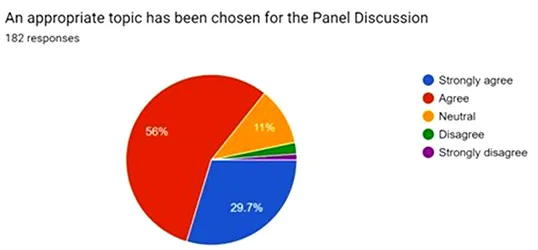
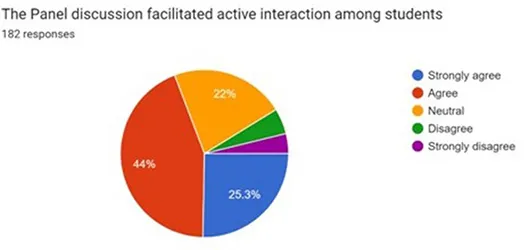
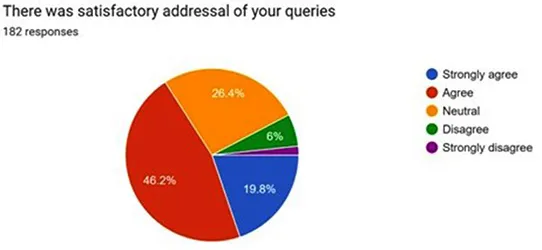
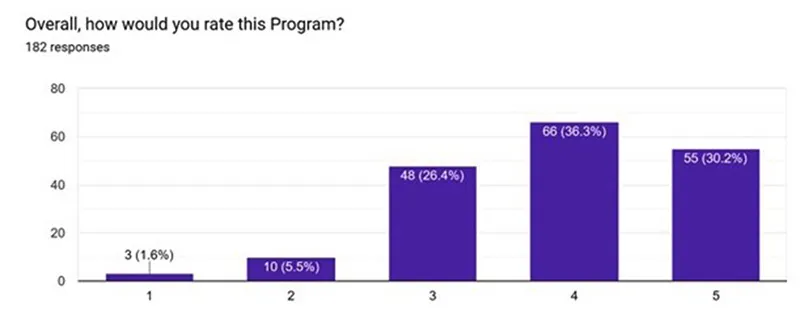
| Strengths | Suggestions for improvement |
|
· It was organized well · Session is good · It was a well conducted and informative session · Awareness on obesity and its complication |
· Could have been more interactive · More images/videos to be added in the content · More clinical correlation · Time management · Some more interesting topics · To be conducted in English fully · Short and crisp information |
B. Faculty’s feedback
| Strengths | Suggestions for improvement |
|
· Topic selection was good · Overall planning was good · Appreciable team work · Well planned and executed |
· Less interaction · Time limit should be informed to resource faculty · PPT of resource faculty could be collected |
| 19th June (5-7 pm) | 20th June (5-7 pm) | 21st June (5.30-7.30 am) |
|
· Pre-test – 10 min · Introduction – 5 min · Starting Prayer – 2 min · Demonstration, benefits, and practice of asanas · Relaxation exercises – 10 min o Neck/Shoulder exercise · Surya namaskara – 10 min · Standing asana – 10 min o Tadasana/ Vrksasana · Sitting – 10 min o Padmasana/ Pascimotānāsana · Supine – 10 min o Navasana/ Uttanapadasana · Prone – 10 min o Makarasana/ Bhujangasana / · Pranayama – 10 min o Kapalabhati / Anuloma-Viloma · Meditation – 10 min · Shavasana – 10 min · Closing prayer and Pledge – 2 min |
· Starting Prayer – 2 min · Demonstration, benefits, and practice of asanas · Relaxation exercises – 10 min o Neck/Shoulder exercise · Surya namaskara – 10 min · Standing asana – 10 min o Ardhakaticakrasana/ Utkatasana · Sitting – 10 min o Vajrasana/ Sasankasana · Supine – 10 min o Navasana/ Uttanapadasana · Prone – 10 min o Makarasana/ Bhujangasana / · Pranayama – 10 min o Kapalabhati / Anuloma-Viloma · Meditation – 10 min · Shavasana – 10 min · Closing prayer and Pledge – 2 min |
· Starting Prayer – 2 min · Demonstration, benefits, and practice of asanas · Relaxation exercises – 10 min o Neck/Shoulder exercise · Surya namaskara – 10 min · Standing asana – 10 min o Padahastasana/ Ardhachakrasana · Sitting – 10 min o Ardhaustrasana/ Gomukhasana · Supine – 10 min o Navasana/ Uttanapadasana · Prone – 10 min o Makarasana/ Bhujangasana / · Pranayama – 10 min o Kapalabhati / Anuloma-Viloma · Meditation – 10 min · Shavasana – 10 min · Closing prayer and Pledge – 2 min · Demonstration of advanced asanas · Appreciation awards to volunteers · Post-test – 10 min |
International day of Yoga 19thJune 2023
International day of Yoga 20thJune 2023
International day of Yoga 21thJune 2023
E-learning
A National Webinar on “E-learning in Physiology” was conducted by department of Physiology on 31.03.21. During the webinar, the different tools used to deliver the content interactively in synchronizing and asynchronizing e-learning platforms and the formative assessment tools used for e-learning were discussed. Audience: All medical professionals
|
SPEAKER:Mrs. SenthamilSelvi K, Assistant professor, Department of Physiology |

Feedback on Webinar
COMMENTS AND SUGGESTIONS FROM THE PARTICIPANTS
| COMMENTS | SUGGESTIONS |
|---|---|
| · Topic was fascinating and need of the hour | Provide stable wifi |
| conducting webinar through microsoft team is good | |
| · slides, Way of presentation | Audio to be improved |
| · Clear presentation with good examples | specific software details |
| · Covered everything related to this topic | Could have been a hands on training |
| Please share the video recording of the session | |
| · Speaker and content | Kindly share or suggest the study/ resource material for future reference. |
| Registration open for more people | |
| · PPt and the images | |
| workshops can be planned | |
| · sensitized about different e-learning tools and formative assessment tools available | More specific discussions on the way for assessments would have been more helpful. |
| · Essential topic at the time of covid, could attend from workplace, | Most of us are in online classes, so time can be adjusted |
IPR
A National Webinar on “An Update on IPR – Patents in Medical Profession” was conducted by department of Physiology on 24.02.21. During the webinar, basic information about Patent, Copyright, Trademarks, Design certification, Geographical indication Tag were discussed. The rising importance for patents in medical Profession and its significance in professional growth was emphasized. The road map to Patent was discussed and the talk was an initiative to educate the medical college faculties about Intellectual property rights. Audience: All medical professionals
|
SPEAKER: Dr.ManganiMangalavalli.S, Assistant professor,Department of Physiology, |

Feedback on Webinar
Comments and suggestions from the participants
| Comments | Suggestions for Improvement |
|---|---|
| It was too good and informative | More interactive discussion needed |
| Understood how to get patent | Hands on session on how to register for patent can be included in future. |
| Learnt about IPR nuances in medical as well as biomedical research. Steps to patent your idea or innovation. | More resource persons.Can keep after OP hours |
| I got an overview of patents and intellectual property rights | Can give more time for the session |
| Learnt that Patent can be done even for things other than devices like surgery etc. Learnt the process of patent approval. | Connectivity issues can be planned for. |
| The nuances of filing IPR in India. Idea about what all comes under intellectual property definition in India. | Some webinars can also include undergraduate students. |
Finding the right journal for Publication- A Cognizance
A National Webinar on National Webinar on “Finding the right journal for Publication- A Cognizance” dated 28.08.2020. During the webinar, the nuances in unlocking the right journal for your manuscript was addressed. The session objectives were to discuss on the recent NMC promotion criteria for medical faculties, points to remember while searching the journal, websites to help you choose the right journal, journal search in various databases like SCOPUS, PUBMED and EMBASE. The ways to identify the predatory journals were also discussed. Audience: All medical professionals
|
SPEAKER: Mrs. SenthamilSelvi K, Assistant professor, Department of Physiology |

Feedback on Webinar
Comments and suggestions from the participants
| Comments | Suggestions for Improvement |
|---|---|
| Very crisp & straight forward presentation | Please share the video recording of presentation |
| Content and slide presentation was good, concise and well explained | Increase duration of webinar |
| Exploring the journal & Finding out the impact factor | Practical Content should be included |
| Nice to learn about fake websites and how to choose right journal | Data analysis can be added Add on citation of paper |
| Good to learn about Indexing of Journal, Acceptance Rate | It will be very helpful if webinar is organized in the evening since faculty then will not miss due to departmental duties |
| Much needed but often neglected topic has been thoroughly covered in this webinar, please keep more such webinars. | Topic divided and taken by some more speakers |
| It rightly guided PG and faculty that even after doing work one has to frame paper according to author instructions for publication as per norms of that journal& when and how to resend that paper after correction to same journal or to another journal | More relevance should be on the idea to eradicate how to eliminate plagiarism |
Heme Splash – 2020
An event of guest lectures and Quiz on blood was organized by department of physiology on 14.02.20. The morning session included three guest lectures and the finale of quiz was conducted in the afternoon session.
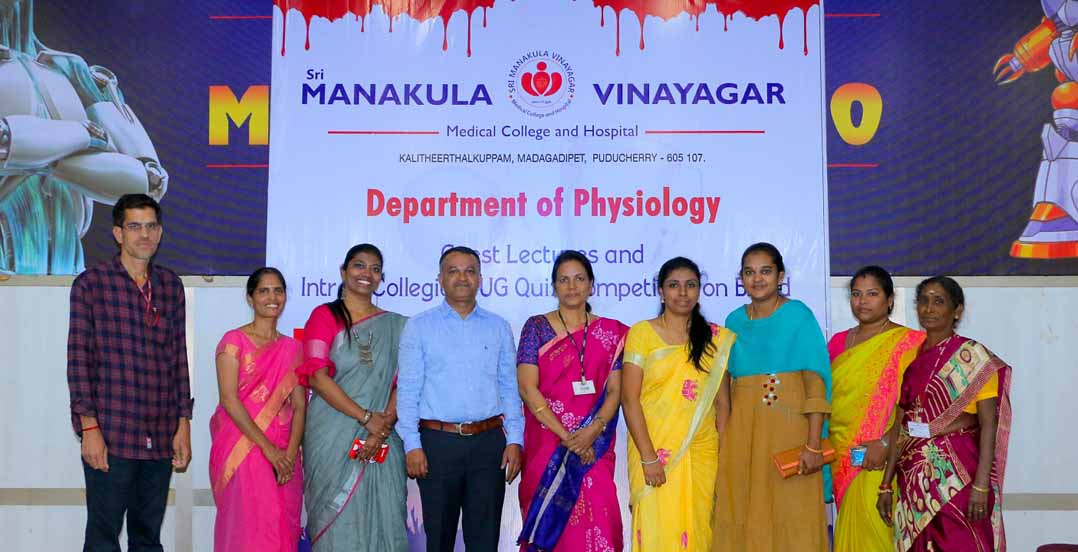
Guest lecture – “Overview of anemia” by Dr Erlie Amel HOD & Professor Dept. of Pathology, Chair person: Dr K.N.Vishwanathan Professor, Dept. of General Medicine SMVMCH
Guest lecture “Pathophysiology of hematologic malignancies in childhood” by Dr Arulkumaran HOD & Professor, Dept. of Pediatrics, Chair person: Dr Vimal Associate Professor, Dept.of Pathology SMVMCH
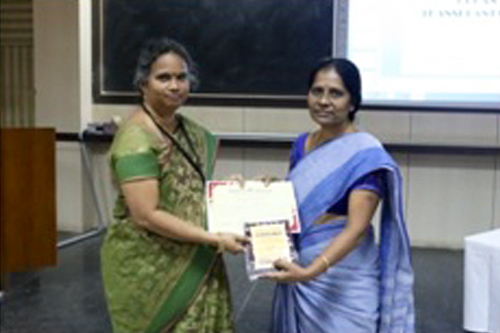
Guest lecture – “organ transplantation” by Dr T. Mangayarkarasi Professor, Department of Microbiology Chair person: Dr Girija Professor, Department of general medicine SMVMCH
Quiz Finale
Quiz Grand Finale was conducted in the auditorium near MIT between 2.00 and 4.00 PM. The judges of the event were Dr ShivayogappaTeli, HOD of Physiology, Dr Suryakumari, HOD of Anatomy and Dr Asmathulla, HOD of Biochemistry. The first three places were given a cash prize of Rs 3000, Rs 2000 and Rs 1000 respectively. All contestants were awarded with books
| S. No. | Date | Nature of Programme | Programme | Chief Guest |
| 1 | 01.02.14 | C M E | ‘‘ECG – Basics and Clinical Applications’’ | Dr. M. Chenniappan, MD.,DM (cardiology), |
| 2 | 21.05.16 | Guest Lecture & Quiz | Myocardial infarction & Lub-dup quiz |
Dr Ajith Ananthakrishna Pillai, MD., DM, FRCP. |
| 3 | 22.07.16 | CME | Mirror neurons – neurons for learning and emotions | Dr. G.K. Pal, MD., MABMS, |
| 4 | 21.10.16 | CME | Healthy ageing | Dr. J.S. Rajkumar M.S., DNB., FRCS |
| 5 | 10.12.16 | Guest Lecture | Interdepartmental Seminar |
Dr. Nivedita Roy, MD., Dr. K. Soundariya, MD., Dr. Ragunathan, MD., |
| 6 | 28.01.17 | Model exhibition | Ravishing replicas |
Dr. L. Paramasivam, Ph.D Dr. K.V.P. Suriyakumari, MD., Dr. Sumathi, MD., |
| 7 | 28.01.17 | Quiz & Guest Lecture | Inter College Quiz Competition “Haemrace” | Dr. Prasanth ganesan, MD., DM, |
Organized and conducted
Department of Physiology has organized an Intra college UG quiz competition on Gastro intestinal system and a guest lecture on 5th Feb. 2019; “GUT WIT – 2019.”
Dr. P. Thirumal, a Gastroenterologist from our institute was the honorable speaker for the guest lecture on “GUT MICROBIOME – The Second Genome.”
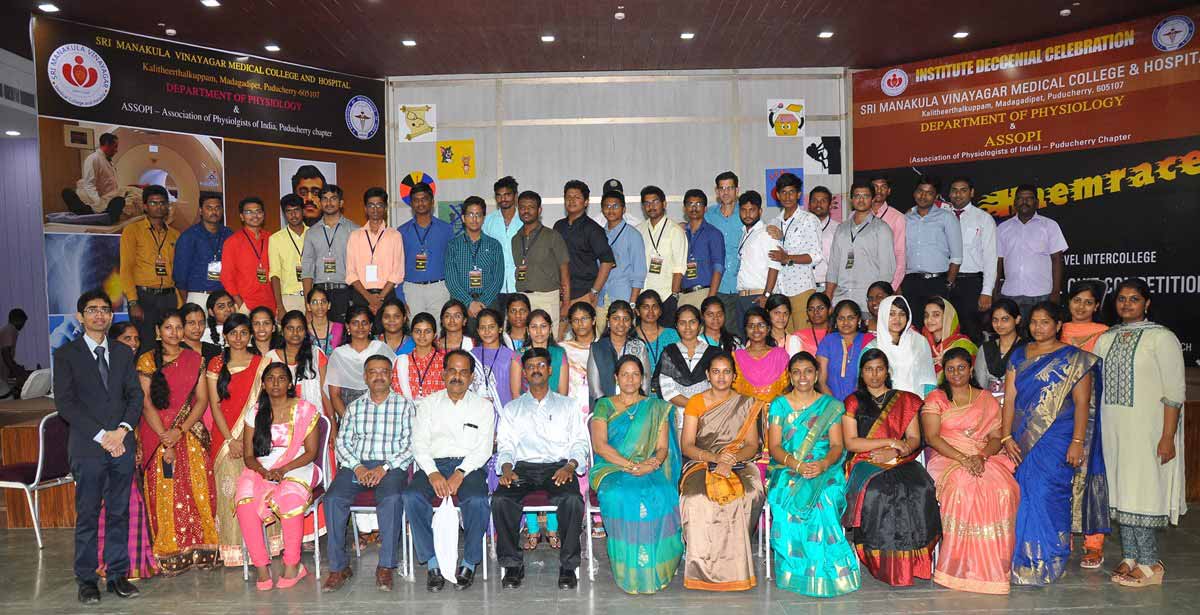
A Guest Lecture on “Stem cell therapy” by Dr. Prasanth ganesan, MD., DM, and an intercollegiate quiz competition was organized. For the quiz program named “HEMRACE” a total of 92 teams from all around Tamil Nadu and Puducherry had registered and exciting prizes were given. Also the models prepared by SMVMCH students related to physiology concepts were displayed and best models were given prizes.
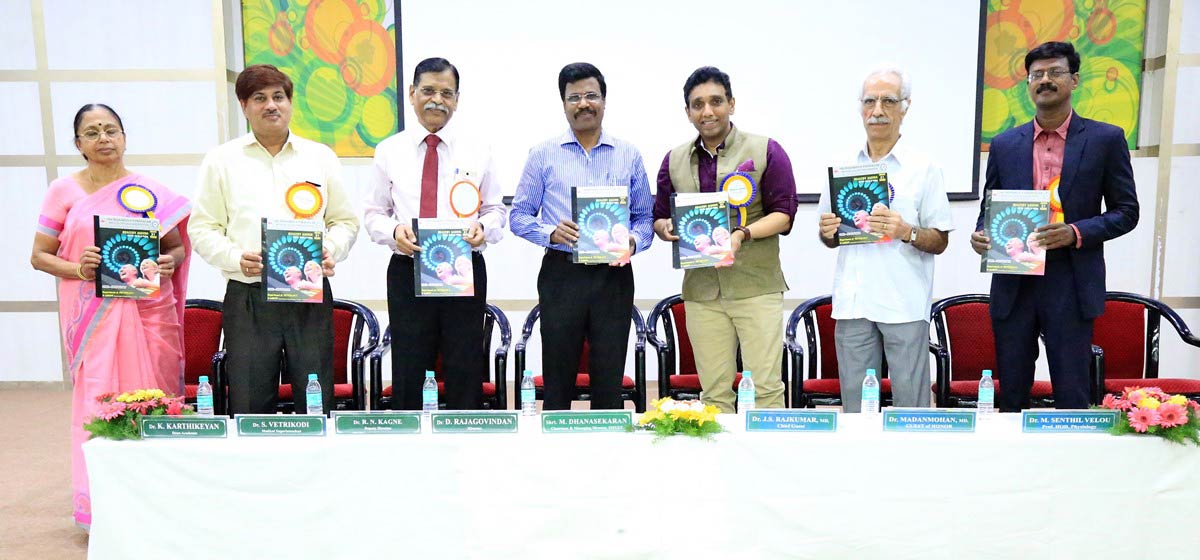
CME on “Healthy Ageing”- Health is considered as a fundamental human right and a worldwide social goal. Due to scientific advancements, life style of the people is tremendously metamorphosing and their physical activities are getting minimal. If this is the scenario midst the affluent population, malnutrition and low immunity – perpetuating secondary diseases are abounding among the present population. In such a context, there arises an essentiality for healthy aging. As a part of the aging process there is mounting scientific and clinical curiosity in relation to nutrition and health. Enlightening yourself with the foods that offer the vitamins and minerals that promote good health as we age is the need of hour.
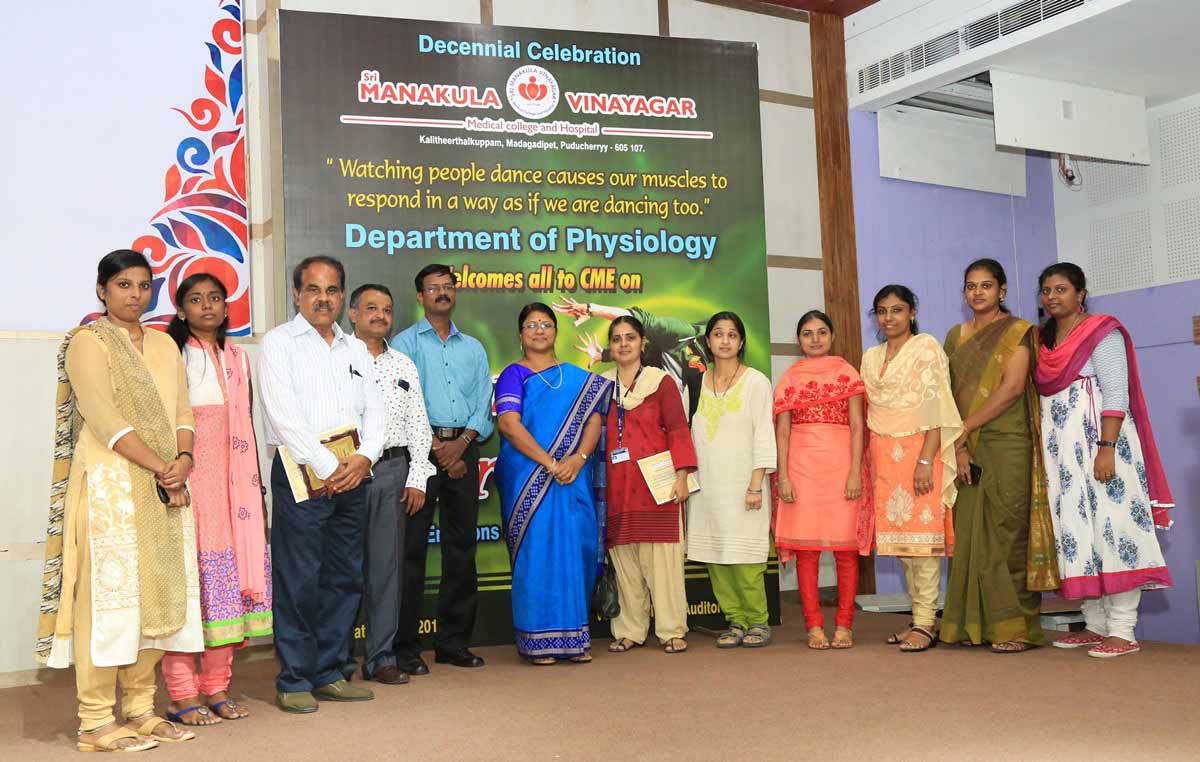
CME on “Mirror Neurons – neurons for learning and emotions”. The mirror neurons fire on observing other persons reactions and are essential brain cells for social interactions. These neurons also form the neurological basis for learning in normal and autism children. Enriching our knowledge with the scientific updates reqgarding the “Mirror Neurons” is essential.
PG Alumini
| Year | S.No | Student Name | Designation | College Name |
| 2011 | 1 |
Dr. Bethiun. S, M.D (Physiology), Reg. No 84014 Phone :9384370168 Email:drbethiun@yahoo.co.in |
Professor and Head, |
Department of Physiology, Maharajah’s Institute of Medical Sciences, Vishakapatinam. |
| 2 |
Dr.Premaraja.R, M.D (Physiology ), Reg. No. 76024 Phone :98942 22384 Email: premaraja_r@yahoo.com |
Associate Professor |
Department of Physiology, Maharajah’s Institute of Medical Sciences, Vishakapatinam |
|
| 2012 | 3 |
Dr. Hemavathy. R, M.D (Physiology), Reg. No. 63897 Phone :9486677940 Email: rhbnithn@gmail.com |
Assistant Professor |
Department of Physiology, Vellore Govt. Medical College, Vellore. |
| 4 |
Dr. Husamuddin. N, M.D (Physiology ) Reg. No. 70829 Phone :9443293684 Email : dr.husamuddin@gmail.com |
Assistant Professor |
Department of Physiology, Government Medical College and Hospital, Krishnagiri. |
|
| 5 |
Dr. Divya. R, M.D (Physiology ), Reg. No. 91442 Phone :7598655100 Email: divyaashok47@yahoo.in |
Professor |
Department of Physiology, Dhanalakshmi Srinivasan Medical College, Perambalur, Trichy. |
|
| 2013 | 6 |
Dr. Abeetha. S, M.D (Physiology), Reg. No. 99743 Phone :9786066178 Email: subramanian.or.abee@gmail.com |
Associate Professor |
Department of Physiology, ACS Medical College and Hospital, Chennai. |
| 7 |
Dr. Mangani Mangalavalli. S, M.D (Physiology ), Reg. No.82174 Phone :9788975553 Email: drmangani@yahoo.co.in |
Assistant Professor |
Department of Physiology, AIIMS Bhubaneswar. |
|
| 2016 | 8 |
Dr. Danti M.D (Physiology ), Reg. No.105489 Phone :9500412118 Email: dants91@gmail.com |
Assistant Professor |
Department of Physiology, Sree Balaji Medical College, Chrompet, Chennai. |

